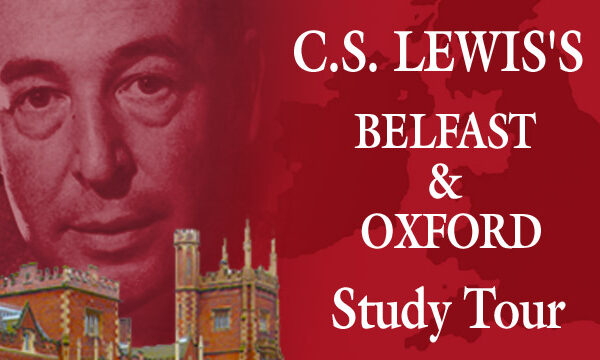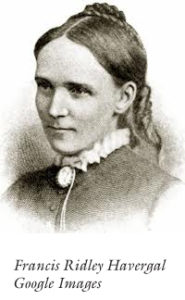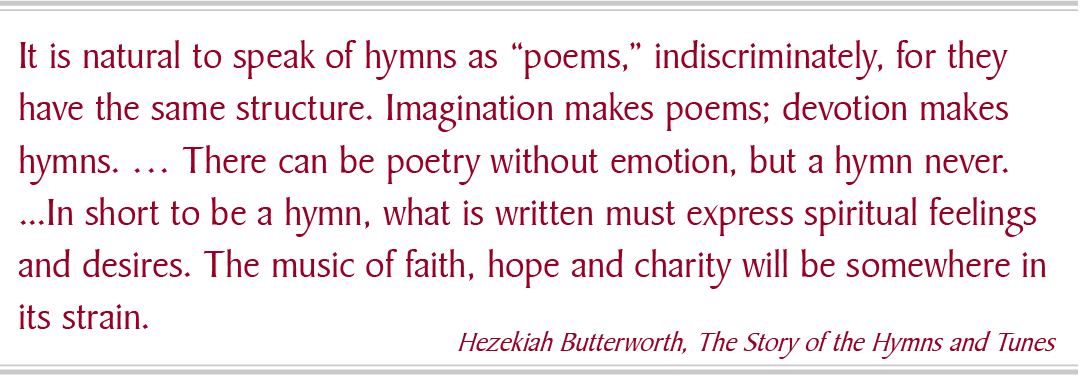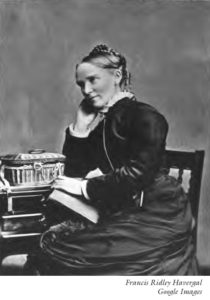Back to series



Frances Ridley Havergal (1836-1879) “Always, Only for My King”
Click here to open a Print - Friendly PDF
| Frances Ridley Havergal was born in Astley, Worcestershire, England, on December 14, 1836.1 She was the youngest of six children born to Jane (Head) and William Havergal, a couple described as “a sterling example of Victorian evangelicalism.”2 Her middle name was after Nicholas Ridley, a Reformation martyr burned at Oxford in 1555.
Frances’ father was the minister at Astley. In his study, books by John Calvin stood side by side with the works of Thomas Hooker, Jeremy Taylor, and many of the Puritan divines. He was a fine preacher. A member of his congregation said, “Nobody preaches like Mr. Havergal; he teaches me what I want. I tell you what he does: he takes a text, picks it all to pieces, and shows us what is inside it, and then makes us feel it.”3 William Havergal was also an accomplished musician and composer. His book, Old Church Psalmody, was an influential collection of church music. Frances grew up in “a large, hospitable and stimulating home in which a mix of tutors, curates, students and suitors engaged in lively conversation.”4 She learned to read by the age of three, and picked up languages listening to the tutorials of her five siblings. When she was nine she helped in teaching a Sunday school class for younger children. In 1845 Mr. Havergal was appointed rector of St. Nicholas, Worcester, a busy city parish. Frances missed her pleasant country life so much that her father called her “a caged lark.”5 Her mother died in 1848, when Frances was twelve. Two years later she was sent to a private school for girls in London. There she perfected her French, learned Italian, and studied music, art, and the Bible, large portions of which she memorized. Frances had resisted attempts by her parents to encourage her to confess faith in Christ as her Savior, but joyfully did so soon after her fifteenth birthday. She wrote: “I committed my soul to the Saviour … and earth and heaven seemed bright from that moment.”6 In 1851 Mr. Havergal married Caroline Cooke, a friend of his daughter Miriam. Caroline was twenty years younger than her husband and her relationship with Frances, who was very close to her father, became difficult at times. In 1860 Mr. Havergal, then in failing health, took a very small rural church in Shareshill, a few miles from Wolverhampton. For the next seven years Frances lived with her sister Miriam and her family in Oakhampton House in Astley parish, where she was governess to her two youngest nieces. In December 1867 she went to Shareshill to help care for her father and stepmother. Her father died in 1870, and Caroline eight years later.
She knelt before the bishop and followed carefully his words, “Defend, O Lord, this thy child with thy heavenly grace, that she may continue thine for ever, and daily increase in thy Holy Spirit, until she come into thy everlasting kingdom.” “If ever my heart followed a prayer,” she wrote, “it did then, if ever it thrilled with earnest longing not unmixed with joy, it did at the words ‘Thine for ever.’”7 That day she wrote a short poem expressing her feeling: Oh! “Thine forever,” what a blessed thing
Frances wrote to her sister Maria that she had come to believe that Christ who had “cleansed me had power to keep me clean; so I utterly yielded myself to him, and utterly trusted him to keep me.”8 Frances also wrote books for children, one of which had the title Little Pillows. Just as we want “a nice soft pillow to lay our heads down upon at night,” she wrote, so our hearts want “a pillow too, something to rest upon, some true, sweet word that we might go to sleep upon happily and peacefully.” In a companion book, Morning Bells, she presented “little chimes of Bible music” for children to wake up by.10 Frances Havergal’s greatest and most lasting work was the writing of hymns. She loved the old hymns of the church and was inspired by the new hymns and gospel songs of Charlotte Elliott (1789-1871) and Fanny Crosby (1820-1915). Frances wrote in a letter to a friend, “I hope you will get to know Charlotte Elliott; it is an honour from God to have had it given her, to write what she has written.” When someone asked, “Who is Fanny Crosby?”11 Frances replied, “She is a blind lady, whose heart can see splendidly in the sunshine of God’s love.” Frances wrote a poem called “A Seeing Heart” about her “dear blind sister over the sea.”12 Frances herself wrote hundreds of hymns, some of which are loved and sung by Christians around the world. She was concerned to write beautiful and memorable words joined with good music, and she was even more committed to writing hymns that clearly expressed biblical truth. In some of the manuscript copies of her hymns, she attached a scripture reference to each line. Her hymn “Without Christ,” based on Ephesians 2:12, contains a verse for each of its one hundred and twelve lines! “I Gave My Life for Thee”One of her earliest published hymns was inspired by a painting she saw in Germany. It showed Christ suffering on the cross, with the words “All this I did for thee. What hast thou done for me?”13 Deeply moved, seventeen-year-old Frances jotted down some thoughts that quickly came to her mind. Back home in England, she tried to make them into a hymn, but became discouraged and threw the paper in the fire. It somehow fell out of the grate unburned. Some months later Frances showed it to her father who encouraged her to finish it. She did, and he wrote the music to accompany the words. In the first verse Jesus speaks some words and asks a question: I gave my life for thee, Many of Frances Havergal’s hymns express her response to the Lord, such as “Jesus, Master, whose I am … let my heart be all thine own, let me live to thee alone.” In “O Savior, Precious Savior” she joins her voice with all God’s people in singing, “We worship you, we bless you, to you alone we sing; we praise you, and confess you our holy Lord and King.” “Golden Harps are Sounding” describes Christ’s ascension: “He who came to save us, he who bled and died, now is crowned with glory at his Father’s side. Never more to suffer, never more to die, Jesus, King of glory, is gone up on high.” “Thou Art Coming, O My Savior” anticipates and celebrates Christ’s Second Coming “in thy beauty all resplendent, in thy glory all transcendent.” “Tell it out!”One snowy Sunday morning in April 1872, Frances was unable to go to church. Reading the Psalms, she came to the words “Tell Tell it out among the heathen that the Tell it out with adoration, “Lord, speak to me that I may speak”The same month that she wrote “Tell It Out,” Frances also wrote “A Worker’s Prayer,” especially for lay helpers in the church: Lord, speak to me that I may speak in living echoes of your tone; Miss Havergal’s theology has been described as “the theology of the Pilgrim’s Progress.”15 She was simple, clear, and compelling in her books and hymns. One Sunday, after a disappointing sermon, she asked the minister, “Oh, why don’t you preach the gospel of Christ?” He answered, “My congregation are well educated and well acquainted with the truths of salvation; if they were Zulus, I should preach differently.” Frances said, “Then I will be a Zulu next Sunday, and just preach at me!” To her delight, a real gospel sermon was the result.16 Frances’ circumstances and frail health prevented her from being a foreign missionary, but she found ways to teach the gospel at home. She began a Bible class for working people. She wrote, “I don’t know who will come, few or many; but I want God’s real converting grace poured out, and I want to be enabled so to speak of Jesus that souls may be won to Him.”17 She supported and assisted various missions, including the Irish Society that provided Bibles and biblical teaching for the people of Ireland. Frances wrote a “Prayer for Ireland,” which began “Gracious Saviour, look in mercy on this island of the west.”18 In the last months of her life, Frances worked on a book called The Royal Invitation. She explained to a friend, “You see, I have only written for Christians as yet (with the exception of a few leaflets), and so I have not fulfilled the great commission, ‘Let him that heareth, say, Come,’ in writing, though of course I am often at it in speaking. So now I want to peal out a COME”!19 “I Am Trusting Thee, Lord Jesus”
|
|||
| Notes: 1. The most recent of several biographies of Frances Ridley Havergal is by Pamela D. Bugden, Ever, Only, All for Thee—Frances Ridley Havergal: Glimpses of Her Life and Writings (Hannibal, Missouri: Granted Ministries Press, 2009). An older but useful book, containing a memoir and selections in prose and verse, is by T. H. Darlow, Frances Ridley Havergal: A Saint of God (New York: Fleming H. Revell Company, 1927). 2. Biographical Dictionary of Evangelicals, 294. 3. Bugden, 120. 4. Biographical Dictionary of Evangelicals, 294. 5. Bugden, 27. 6. Bugden, 30. 7. Andrew Atherstone, “Francis Ridley Havergal, 1836-1879” in The Heart of Faith: Following Christ in the Church of England (Lutterworth Press), 111. 8. Faith Cook, Our Hymn-Writers and Their Hymns (Darlington, England: Evangelical Press, 2005), 317. 9. Bugden, 71. 10. Bugden, 109-10. 11. Valuable Selections from the Writings of Frances Ridley Havergal (Hannibal, Missouri: Granted Ministries Press, 2009), 95. 12. Bugden, 49. 13. According to some accounts, Frances saw the picture in the home of a German pastor; others say that she saw the painting by Domenico Feti entitled Ecce Homo (“Behold the Man”) in the art museum at Düsseldorf. This same picture so moved Nikolaus Ludwig von Zinzendorf that then and there the young Count asked the crucified Christ to draw him into “the fellowship of his sufferings” and to show him what he should do. Zinzendorf became the leader of the Moravian movement that gave rise to Protestant world missions. J. E. Hutton, A History of the Moravian Church, 186. 14. Bugden, 101. 15. Darlow, 14. 16. Bugden, 79. 17. Atherstone, 118. 18. Bugden, 38. 19. Valuable Selections, 59. 20. Atherstone, 119. 21. Bugden, 63. 22. Cook, 312. 23. Atherstone, 118-19. 24. Atherstone, 118. 25. Bugden, 155. 26. Then Sings My Soul: 150 of the World’s Greatest Hymn Stories, Books 1 and 2 (Nashville: Thomas Nelson Publishers) 1:191. 27. Then Sings My Soul 2:173. 28. Bugden, 95. 29. Darlow, 7. 30. Darlow, 26. 31. Bugden, 63. 32. Jane Stuart Smith and Betty Carlson, Great Christian Hymn Writers (Wheaton, Illinois: Crossway Books, 1997),82. 33. Bugden, 159. 34. Bugden, 159. 35. Bugden, 160. 36. Then Sings My Soul 1:201. 37. Then Sings My Soul 2:175. 38. Bugden, 44. |
|||

David B. Calhoun
ProfessorDavid B. Calhoun, (1937-2021) was Professor Emeritus of Church History at Covenant Theological Seminary in St. Louis, Missouri. A minister of the Presbyterian Church in America, he has taught at Covenant College, Columbia Bible College (now Columbia International University), and Jamaica Bible College (where he was also principal). Calhoun has served with Ministries in Action in the West Indies and in Europe and as dean of the Iona Centres for Theological Study. He was a board member (and for some years president) of Presbyterian Mission International, a mission board that assists nationals who are Covenant Seminary graduates to return to their homelands for ministry.

 COPYRIGHT: This publication is published by C.S. Lewis Institute; 8001 Braddock Road, Suite 301; Springfield, VA 22151. Portions of the publication may be reproduced for noncommercial, local church or ministry use without prior permission. Electronic copies of the PDF files may be duplicated and transmitted via e-mail for personal and church use. Articles may not be modified without prior written permission of the Institute. For questions, contact the Institute: 703.914.5602 or email us.
COPYRIGHT: This publication is published by C.S. Lewis Institute; 8001 Braddock Road, Suite 301; Springfield, VA 22151. Portions of the publication may be reproduced for noncommercial, local church or ministry use without prior permission. Electronic copies of the PDF files may be duplicated and transmitted via e-mail for personal and church use. Articles may not be modified without prior written permission of the Institute. For questions, contact the Institute: 703.914.5602 or email us.
-
Recent Podcasts
A Welcome Change in Apologetics
by Randy Newman, Aimee Riegert on April 19, 2024We’re burdened for our friends who don’t know...Read More
-
Questions That Matter Podcast – Samuel James and Digital Liturgies
by Samuel James, Randy Newman on April 19, 2024
-
The Side B Stories – Dr. James Tour’s story
by Jana Harmon, James Tour on April 12, 2024
-
Recent Publications
Isn’t Morality Relative?
by Christopher L. Reese on April 1, 2024It is widely accepted in the Western world...Read More
-
Do Muslims and Christians Worship the Same God?
by Andy Bannister on March 1, 2024
-
Artificial Intelligence and Its Impacts on Humanity
by John Lennox on February 13, 2024
0
All Booked
0.00
All Booked
0.00
All Booked
20599
GLOBAL EVENT: 2024 Study Tour of C.S. Lewis’s Belfast & Oxford
https://www.cslewisinstitute.org/?event=global-event-2023-study-tour-of-c-s-lewis-belfast-oxford-2&event_date=2024-06-22®=1
https://www.paypal.com/cgi-bin/webscr
2024-06-22

Next coming event
Days
Hours
Minutes
Seconds
GLOBAL EVENT: 2024 Study Tour of C.S. Lewis’s Belfast & Oxford
On June 22, 2024 at 12:00 pmat Belfast, Northern Ireland & Oxford, EnglandSpeakers

David B. Calhoun
Professor
Team Members

David B. Calhoun
ProfessorDavid B. Calhoun, (1937-2021) was Professor Emeritus of Church History at Covenant Theological Seminary in St. Louis, Missouri. A minister of the Presbyterian Church in America, he has taught at Covenant College, Columbia Bible College (now Columbia International University), and Jamaica Bible College (where he was also principal). Calhoun has served with Ministries in Action in the West Indies and in Europe and as dean of the Iona Centres for Theological Study. He was a board member (and for some years president) of Presbyterian Mission International, a mission board that assists nationals who are Covenant Seminary graduates to return to their homelands for ministry.



 On Advent Sunday in 1873, when she was eighteen, Frances was confirmed in Worcester Cathedral. It was a turning point in her life.
On Advent Sunday in 1873, when she was eighteen, Frances was confirmed in Worcester Cathedral. It was a turning point in her life.
 Frances was sometimes overwhelmed by her work—answering fifteen to twenty letters every morning, correcting proofs for herbooks, and writing hymns and poems. She was not well, and her doctor said that she “ought not to touch a pen.”27 After reading Exodus 32:26—“Then Moses stood in the gate of the camp and said, ‘Who is on the Lord’s side? Come to me’”—Frances wrote another “consecration hymn.” The first verse begins with a string of questions:
Frances was sometimes overwhelmed by her work—answering fifteen to twenty letters every morning, correcting proofs for herbooks, and writing hymns and poems. She was not well, and her doctor said that she “ought not to touch a pen.”27 After reading Exodus 32:26—“Then Moses stood in the gate of the camp and said, ‘Who is on the Lord’s side? Come to me’”—Frances wrote another “consecration hymn.” The first verse begins with a string of questions:

